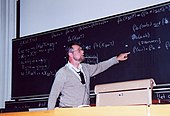
Back صيغة رياضية Arabic Düstur Azerbaijani Математик формула Bashkir Формула Bulgarian সূত্র Bengali/Bangla Fórmula Catalan فورمووڵ CKB Vzorec Czech Формула CV Fformiwla Welsh

In science, a formula is a concise way of expressing information symbolically, as in a mathematical formula or a chemical formula. The informal use of the term formula in science refers to the general construct of a relationship between given quantities.
The plural of formula can be either formulas (from the most common English plural noun form) or, under the influence of scientific Latin, formulae (from the original Latin).[2]
- ^ Dijkstra, E.W. (July 1996), A first exploration of effective reasoning [EWD896]. (E.W. Dijkstra Archive, Center for American History, University of Texas at Austin)
- ^ "formula". Oxford English Dictionary (Online ed.). Oxford University Press. (Subscription or participating institution membership required.)

